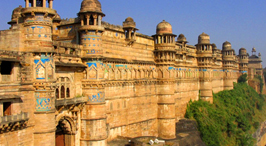
- Mobile
+91-9958308506
- E-Brochure
Download E-Brochure


Gwalior is a historical and major city in the Indian state of Madhya Pradesh. It is located to the south of Agra, 319 kilometres (198 mi) south of Delhi the capital city of India, and 423 kilometres (263 mi) north of Bhopal, the state capital. Gwalior occupies a strategic location in the Gird region of India, and the city and its fortress have served as the center of several of historic northern Indian kingdoms. It is famous for Gwalior Fort, which has changed hands many times. From the Tomaras in the 8th century, it passed to the Mughals, then the Marathas under the Scindias (1754).
Besides being the Administrative Headquarters of Gwalior district and Gwalior division, Gwalior also hosts some administrative offices of Chambal Division. Gwalior also hosts several Administrative Headquarters of the State as well the Country; Few of them are The High Court of Madhya-Pradesh (Gwalior Bench), Office of The Narcotics Commissioner of India (Central Bureau Of Narcotics), Office of The Accountant-General (AG) of Madhya-Pradesh, Office of The President-Board Of Revenue of Madhya-Pradesh, Office of The Transport-Commissioner of Madhya-Pradesh, Office of The Commissioner-Land Records & Settlements Madhya-Pradesh, Office of The State Excise Commissioner of Madhya-Pradesh etc. Gwalior also hosts Premiere Government Institutions like Defense Research & Development Establishment(DRDE), Country's only Border Security Force (BSF) Academy, National Cadet Corps (NCC) Officer's Training Academy (OTA). Gwalior also features a major Indian Air Force (IAF) Station, A major Indian Army Cantonment (Morar Cantt.), Central Intelligence Bureau HO. Numerous Colleges and Universities are located in Gwalior including NRIITM Gwalior, IIITM Gwalior & IITTM Gwalior.
Gwalior is surrounded by industrial and commercial zones of neighboring districts (Malanpur - Bhind, Banmor - Morena) on all three main directions. Gwalior is one of the largest city of Central India and is often referred to as the tourist capital of the Madhya-Pradesh; The State being called as The Heart Of Incredible India.
Gwalior Airport (IATA: GWL, ICAO: VIGR), also called Rajmata Vijya Raje Scindia Vimantal, is the airport of Gwalior. It has an Indian Air Force Base which stations Mirage fighters
Scindia is a Maratha clan in India. This clan included rulers of the Gwalior State in the 18th and 19th centuries, collaborators of the colonial British government during the 19th and the 20th centuries until India became independent, and politicians in independent India.
The Scindia state of Gwalior became a major regional power in the second half of the 18th century and figured prominently in the three Anglo-Maratha Wars. (Gwalior first fell to the British in 1780.) The Scindias held significant power over many of the Rajput states, and conquered the state of Ajmer. During the Indian Rebellion of 1857 the city was briefly held by rebel forces in 1858 until they were defeated by the British. The Scindia family ruled Gwalior until India's independence from the United Kingdom in 1947, when the Maharaja Jivajirao Scindia acceded to the Government of India. Gwalior was merged with a number of other princely states to become the new Indian state of Madhya Bharat. Jivajirao Scindia served as the state's rajpramukh, or appointed governor, from 28 May 1948 to 31 October 1956, when Madhya Bharat was merged into Madhya Pradesh.
In 1962, Rajmata Vijayraje Scindia, the widow of Maharaja Jivajirao Scindia, was elected to the Lok Sabha, beginning the family's career in electoral politics. She was first a member of the Congress Party, and later became an influential member of the Bharatiya Janata Party. Her son, Maharaja Madhavrao Scindia was elected to the Lok Sabha in 1971 representing the Congress Party, and served until his death in 2001. His son, Jyotiraditya Scindia, also in the Congress Party, was elected to the seat formerly held by his father in 2004.
Maharaja Express Guest Always Special for us
 Comparison Chart
Comparison Chart Fact Sheet
Fact Sheet  History
History